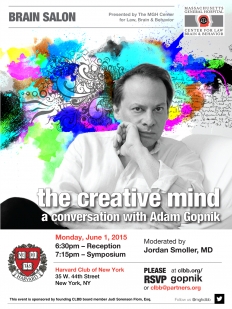Creative expression, whether in music, visual arts or great literature, may shed light on the most important and elusive neuroscience question of them all – how does the brain enable the mind? In turn, neuroscience may be able to probe the components of creative genius, characterizing what makes certain artistic works evocative, transfixing, or even transcendent.
 On Monday, June 1, the MGH Center for Law, Brain and Behavior hosted “The Creative Mind: A Conversation with Adam Gopnik” event at the Harvard Club of New York City, moderated by Jordan Smoller, MD, ScD. The evening began with a reception and artistic performance, followed by a conversation between The New Yorker writer and the psychiatric geneticist.
On Monday, June 1, the MGH Center for Law, Brain and Behavior hosted “The Creative Mind: A Conversation with Adam Gopnik” event at the Harvard Club of New York City, moderated by Jordan Smoller, MD, ScD. The evening began with a reception and artistic performance, followed by a conversation between The New Yorker writer and the psychiatric geneticist.
Adam Gopnik has been a staff writer at The New Yorker since 1986. During his tenure at the magazine, he has written fiction, humor, book reviews, profiles, and reported pieces from abroad. He was the magazine’s art critic from 1987-1995, and the Paris correspondent from 1995-2000. From 2000 to 2005, he wrote a journal about New York life. His books, ranging from essay collections about Paris and food to children’s novels, include “Paris to the Moon,” “The King in the Window,” “Through the Children’s Gate: A Home in New York,” “Angels and Ages: A Short Book About Darwin, Lincoln, and Modern Life,” “The Table Comes First: Family, France, and the Meaning of Food,” and “Winter: Five Windows on the Season.” Gopnik has three National Magazine awards, for essays and for criticism, and also the George Polk Award for Magazine Reporting. In March of 2013, Gopnik was awarded the medal of Chevalier of the Order of Arts and Letters. He lectures widely, and, in 2011, delivered the Canadian Broadcasting Corporation’s Massey Lectures.
Jordan Smoller, MD, ScD is a CLBB faculty member and Director of the Psychiatric and Neurodevelopmental Genetics Unit, Associate Chief for Research in Psychiatry, and Director of Psychiatric Genetics at the Massachusetts General Hospital. He is also Professor of Psychiatry at Harvard Medical School and Professor of Epidemiology at Harvard School of Public Health. Additionally, Smoller is the author of the popular science book, The Other Side of Normal: How Biology Is Providing the Clues to Unlock the Secrets of Normal and Abnormal Behavior.
This event was sponsored by founding CLBB board member Judi Sorenson Flom, Esq.
To watch video of the entire Gopnik event, or explore past events on mind, brain, and creativity, see CLBB’s Vimeo channel.



